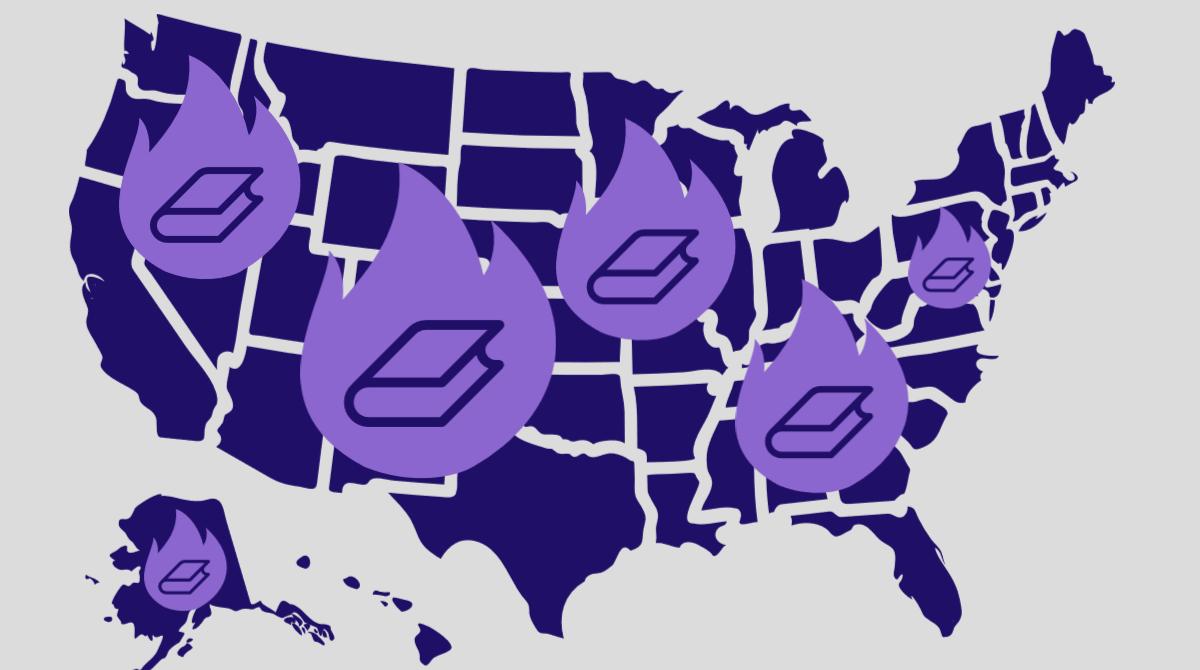Libraries and schools across the country are experiencing unprecedented levels of attempts to ban or remove books from their shelves. I Love Libraries will continue to raise awareness by highlighting attempts to censor library materials, as well as efforts by librarians, parents, students, and concerned citizens to push back against them. This report includes news from Nebraska and Minnesota, as well as a look at the economic impact of book bans.
Nebraska bill that would subject librarians to criminal charges for giving ‘obscene material’ to children fails
A bill that would have held school librarians and teachers in Nebraska criminally responsible for providing “obscene material” to K-12 students failed to break a filibuster in the state legislature on March 20, reports ABC News.
State Sen. Joni Albrecht, who introduced the bill, said it simply would close a “loophole” in the state’s existing obscenity laws that prohibit adults from giving such material to minors. But critics say it is a way for a vocal minority to ban books they don’t like from schools and public librar.ies
The two-day-long debate on the bill was contentious: One Republican lawmaker who name-checked a fellow legislator while reading a graphic account of sexual violence from a best-selling memoir is now being investigated for sexual harassment.
Sen. Danielle Conrad, a free speech advocate and former director of the Nebraska chapter of the American Civil Liberties Union, chastised bill supporters, saying they were pandering to those who want to ban books.
“This debate is divorced from reality,” she said. “It’s embarrassing to Nebraska. And we have bigger, important issues to address.”
‘Ban on book bans’ introduced in Minnesota legislature
New legislation introduced in Minnesota would prohibit banning books in public and school libraries based on content or subjective objections, reports MPR News. The legislation comes as other states have made steps to restrict books from schools and libraries.
The bill would ensure the responsibility of library materials is solely on licensed library media specialists that have a master’s degree in library sciences or information sciences, are a professional librarian or have experience with library collection management.
Current Minnesota law allows parents and guardians to make this decision on a personal level. Under the proposed bill, parents would retain this power to opt their child out of being exposed to materials they deem unfit while protecting books from being removed from schools entirely.
Gov. Tim Walz, who strongly backs the bill, said it is an issue he sees no gray area in.
“Those who have asked for book bans have never been on the right side of history, they have never been viewed as being the folks that were the heroes of freedom, they have never been viewed as the people that were looking out for others,” Walz said. “Trying to tell someone else’s children that they can’t read “The Hobbit,” or whatever it might be, you’re in the wrong.”
The costs of banning books
Book bans are causing economic strife, from authors to school and library districts, reports Marketplace.
Authors of books that have been banned and challenged in the U.S. say the moves are impacting their ability to make a living. Many authors whose books are banned don’t get much media attention, especially now that so many are being targeted, says Marketplace. While some books facing bans are bestsellers, “others are books that are less well known,” said Kasey Meehan, program director of Freedom to Read at PEN America. “And it can be quite detrimental to the economics of that book, to be banned in that way.”
Author Ellen Hopkins knows this all too well.
“As far as I know, all 14 of my young adult novels have been banned somewhere,” Hopkins told Marketplace last year. Because of those bans, Hopkins said she has received a lot of press attention and seen a recent spike in sales. But in years past, when her books were banned and there was less media interest, sales dried up and her royalty checks shrunk.
“School libraries are a big part of our market,” she said. “So, when they’re not allowed to repurchase them, then of course it’s going to affect book sales.”
In addition to sales figures dropping, many authors are losing paid speaking engagements.
“Paid school visits were a very large part of my income, maybe a quarter to a third of my annual income,” said Mike Curato, author and illustrator of the graphic novel, “Flamer,” about a boy who’s dealing with bullying and racism and coming to terms with his sexual identity. “Flamer” has been banned and challenged in multiple schools across the U.S.
“I have not been getting the invitations that I used to get,” he said. “I get a few here and there, but it’s nothing like the income that I used to rely on.”
Challenges and bans cost schools too, as school boards must pay staffers to review texts and determine whether there’s a legitimate reason to ban or restrict them. Librarians must also devote time to removing banned materials from their stacks.
In Florida, school districts are spending between $34,000 and $135,000 per year to comply with a 2023 state law that requires them to review all challenged books for sexually explicit content.
Take action
Alarmed by the escalating attempts to censor books? Here are five steps you can take now to protect the freedom to read.
- Follow news and social media in your community and state to keep apprised of organizations working to censor library or school materials.
2. Show up for library workers at school or library board meetings and speak as a library advocate and community stakeholder who supports a parent’s right to restrict reading materials for their own child but not for all
3. Help provide a safety net for library professionals as they defend intellectual freedom in their communities by giving to the LeRoy C. Merritt Humanitarian Fund.
4. Educate friends, neighbors, and family members about censorship and how it harms communities. Share information from Banned Books Week.
5. Join the Unite Against Book Bans movement and visit our Fight Censorship page to learn what you can do to defend the freedom to read in your community.
Subscribe to the I Love Libraries newsletter! You’ll get monthly updates on library news, advocacy updates, book interviews, book info, and more!




